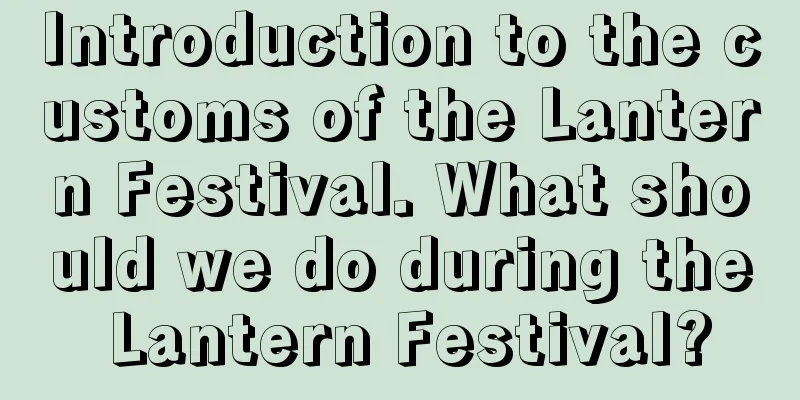Introduction to the customs of the Lantern Festival. What should we do during the Lantern Festival?

There will be different customs and activities on different festivals. So, let’s take a look. When the first month of the lunar year comes, every household is full of joy. The first month of the lunar year has the customs of the Lantern Festival. What should we do on the Lantern Festival? What about customs? What other festivals are there besides the first day of the Spring Festival? Just go to Shuimoxiansheng.com’s 2021 New Year special topic and you’ll know!Introduction to the customs of the Lantern Festival. What should we do during the Lantern Festival?1. Eat YuanxiaoYuanxiao is eaten on the fifteenth day of the first lunar month. As a food, "Yuanxiao" has a long history in my country. In the Song Dynasty, a novel food for the Lantern Festival became popular among the people. This kind of food was first called "Fuyuanzi" and later called "Yuanxiao". Businessmen also called it "Yuanbao". Yuanxiao, also known as "tangyuan", is filled with sugar, rose, sesame, bean paste, osmanthus, walnut kernels, nuts, jujube paste, etc. It is wrapped in glutinous rice flour into a round shape. It can be meat or vegetarian, with different flavors. It can be cooked in soup, fried, or steamed, symbolizing reunion and happiness. The glutinous rice balls in Shaanxi are not wrapped but "rolled" in glutinous rice flour and then boiled or fried. They are hot and round. 2. Lantern Festival The fifteenth day of the first lunar month is the Lantern Festival. During this festival, people have the custom of hanging lanterns, lighting lanterns, and watching lanterns, so it is also called the Lantern Festival. Playing with lanterns is a traditional festival custom of the Lantern Festival, which originated in the Western Han Dynasty and flourished in the Sui and Tang Dynasties. After the Sui and Tang Dynasties, the custom of lighting lanterns became popular and was passed down to later generations. 3. Guess lantern riddles Guessing lantern riddles, also known as playing lantern riddles, is a traditional folk cultural and entertainment form unique to China with rich national style. It is a special activity of the Lantern Festival that has been passed down since ancient times. On the fifteenth day of the first lunar month, traditional people would hang up colorful lanterns and set off fireworks. Later, some people wrote riddles on pieces of paper and posted them on colorful lanterns for people to guess. 4. Dragon lantern show Dragon lantern performance is also known as dragon lantern dance or dragon dance. The first recorded dragon dance was in the "Fu of Western Capital" by Zhang Heng of the Han Dynasty. The author gave a vivid description of the dragon dance in the narration of a hundred plays. According to the "Book of Sui·Music Records", during the reign of Emperor Yang of Sui, the "Yellow Dragon Change" performance, which was similar to the dragon dance in various acrobatics, was also very exciting and dragon dance became popular in many places in China. The Chinese worship the dragon and regard it as a symbol of good luck. 5. Walking on stilts Stilt walking is a popular mass performance among the people. Stilt walking is a type of acrobatics in ancient China and appeared as early as the Spring and Autumn Period. The earliest introduction of stilts in China was in the chapter "Shuo Fu" of Liezi: "There was a man named Lan Zi in Song who showed his skills to Song Yuan. Song Yuan summoned him and showed him his skills. Lion dancing is an excellent Chinese folk art. During the Lantern Festival or gatherings and celebrations, people perform lion dancing to add to the fun. This custom originated in the Three Kingdoms period, became popular during the Southern and Northern Dynasties, and has a history of more than a thousand years. 7. Land Boating Land boat rowing, also known as land boat running, is to imitate the movements of a boat on land. Most of the people who perform land boat running are girls. The land boat is not a real boat. It is made of two thin boards, sawn into a boat shape, tied with bamboo and wood, and covered with colorful cloth. It is tied around the girl's waist. It is like sitting in a boat. She holds oars in her hands and makes rowing gestures while running, singing local tunes and dancing at the same time. This is land boat rowing. 8. Give a lantern to your child It is abbreviated as "sending lanterns" or "sending flower lanterns", which means that before the Lantern Festival, the daughter's parents send flower lanterns to the family of the newly married daughter, or relatives and friends send lanterns to the family of a newly married couple without children, in order to pray for a good omen of having children, because "lantern" and "ding" are homophones. 9. Welcoming Zigu Zi Gu is also called Qi Gu, and in the north it is often called Toilet Gu or Keng San Gu. According to ancient folk customs, on the fifteenth day of the first lunar month, people would welcome the toilet goddess Zi Gu and offer sacrifices to her, and predict silkworms and other matters. 10. Get rid of all diseases "Walking away all diseases", also known as touring all diseases, dispersing all diseases, roasting all diseases, walking on a bridge, etc., is an activity to eliminate disasters and pray for health. On the night of the Lantern Festival, women make appointments to go out together. They walk together and cross every bridge they see, believing that this can cure diseases and prolong life. Introduction to the customs and habits of the Lantern FestivalWhen it comes to the Lantern Festival, common customs must be eating rice dumplings, appreciating lanterns, guessing lantern riddles, dragon and lion dances, etc. But if we trace it back to the basics, why does the Lantern Festival have these customs? Ultimately, it is closely related to traditional agricultural civilization. As the saying goes, "The most important affairs of a country lie in sacrifices and wars." This means that the most important affairs of a country lie in sacrifices and wars.For a large-scale traditional festival like the Lantern Festival, the main focus is naturally on offering sacrifices and praying for blessings. In ancient times, farmers believed in gods and ghosts, so if they wanted to offer sacrifices and pray for good weather, they naturally had to pray to the Dragon King, who controls water. That’s why they performed dragon and lion dances to pray to the Dragon King for good weather in the new year. The reason why the Lantern Festival is called the Lantern Festival is because the ancients emphasized having many children and good fortune. The word “lantern” is very similar to the “ding” in “population”, hence the name. |
>>: Is the Lantern Festival in 2021 a good date? Can I get married there?
Recommend
Is March 3rd the Ghost Festival? How many Ghost Festivals are there and when are they celebrated?
Is March 3rd the Ghost Festival? How many Ghost Fe...
Is it a good year for people born in the Year of the Rooster to buy a house in 2017? What Feng Shui issues should people born in the Year of the Rooster pay attention to?
Introduction: Everyone knows that Feng Shui will h...
Analysis of the day pillar and overall fortune of girls born on the day before the beginning of spring in 2021
Introduction: New life comes into this world every...
It’s White Dew on September 8, 2018. Can I get a haircut?
In the seventh month of the lunar calendar, summer...
What to eat during the 24 solar terms Xiaoxue if not dumplings? Eating these “four winter foods” is the most nutritious!
The Minor Snow solar term is the 20th of the 24 so...
Can married women go back to their parents’ home during the Dragon Boat Festival? What are the rules?
The Dragon Boat Festival is one of China's tra...
Is the day before Grain Full in 2020 an auspicious day for burying the deceased? What are the three signs of Grain Full?
Introduction: It is necessary to choose an auspici...
Is it possible to worship ancestors on the sixth day of the ninth lunar month in 2022? What should we pay attention to?
Ancestor worship is a term that is becoming increa...
What is the fate of a baby chicken born on September 25th of the lunar calendar in 2017?
Introduction: Although each child cannot choose th...
What are the etiquette and precautions for giving gifts on May 1st Labor Day?
Although giving gifts can bring people closer toge...
Is February 24th of the lunar calendar in 2022 an auspicious day for signing a contract? What should I pay attention to when signing a contract?
The second month of the lunar calendar is also cal...
What is the lunar calendar for February 24, 2021? Is it suitable for funerals?
Folk customs believe that burial is a big event, a...
Is it a good idea to open a new store on the tenth day of the fifth lunar month in 2017? Is the day suitable?
Introduction: All people who open a store to do bu...
Check out the Winter Solstice blessings for family and friends, and send Winter Solstice festival blessings via text messages!
Giving each other blessings has become a trend. Wh...
Is it bad luck for those born at 0:00 on June 16, 2019, Father’s Day?
There is no official Father's Day in mainland ...









